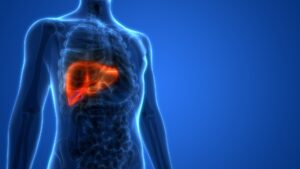
According to a new study, even subtle forms of liver disease can have direct and lasting impacts on cardiac health. Through detailed research involving hundreds of participants, scientists have found hard evidence that specific markers indicating liver damage can be associated with long-term adverse effects on the heart – including severe complications such as stroke or heart attack. Read on to learn how some surprising results from this new study could impact your overall wellness.
The study from Smidt Heart Institute at Cedars-Sinai compared patients’ FIB-4 scores with heart abnormalities visible through cardiac MRI scans. The markers are for liver fibrosis which can indicate a risk of developing severe liver disease.
It was found that elevated FIB-4 scores were associated with abnormalities in heart function and vascular dimension. Previous studies have suggested that nonalcoholic fatty liver disease was associated with cardiovascular death; however, the relationship was poorly understood.
Due to the limitations of previous studies, researchers were only able to look at how cirrhosis and nonalcoholic fatty liver disease can affect the heart without the mechanisms behind the link. Researchers believe the outcomes may have also been obscured by risk factors that the two conditions have in common such as diabetes. However, this new study has found missing information from previous research.
The American Heart Association (AHA) has recently released a statement saying that nonalcoholic fatty liver disease is a risk factor for atherosclerotic cardiovascular disease.
This common liver condition affects more than one in four adult Americans, so it is vital to understand how it may affect heart health. After all, heart disease, not the progression of liver disease, is the leading cause of death in people with nonalcoholic fatty liver disease, according to the AHA.
“If 25% of the population has this potential risk factor for cardiac disease, we knew we needed to understand it more fully,” Alan Kwan, MD, author of the study. “So, our overall aim with this study was to examine the connections between the heart and the liver—a newer area of study, but one that made sense to explore further. The liver processes cholesterol and produces factors involved in blood clotting and inflammation—all of which can affect the heart—so we wanted to take a closer look at these associations.
Typically, when physicians examine the heart, they are not thinking about the liver and vice versa. However, this study indicates that healthcare professionals should be screening for liver conditions when looking at the heart. The heart and liver should not be viewed as completely separate organs in the body.
Heart and Liver Health
As one of the most important organs in the human body, the liver works 24 hours a day to produce and process many of the chemicals the body requires. It processes over 500 functions, including hormone production, bile secretion, and converting sugars into glycogen.
Liver Rescue is a formula designed to support and maximize the performance of a healthy liver through its 7 ingredients. These powerful ingredients can help fight free radicals, improve bile production, remove toxins, and give your liver the support it deserves
Keeping the heart strong and healthy is vital for enjoying a high quality of life as you age. Heart Rescue was designed to help support and promote cardiovascular health using a variety of ingredients, including omega-3 fatty acids, CoQ10, magnesium, and hawthorn extract. This formula’s health benefits can help strengthen the heart muscle, support circulation, and help reduce the risk of heart disease.